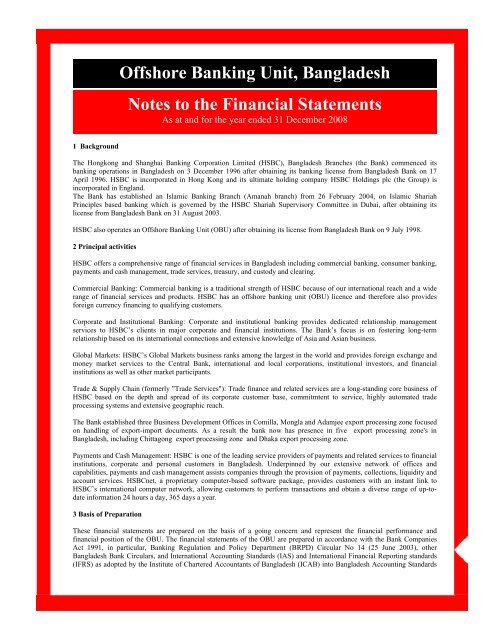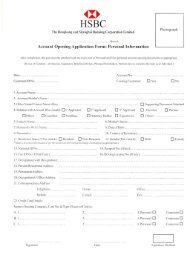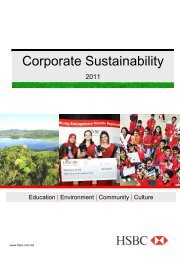Offshore Banking Unit, Bangladesh Notes to the Financial Statements
Offshore Banking Unit, Bangladesh Notes to the Financial Statements
Offshore Banking Unit, Bangladesh Notes to the Financial Statements
You also want an ePaper? Increase the reach of your titles
YUMPU automatically turns print PDFs into web optimized ePapers that Google loves.
1 Background<br />
<strong>Offshore</strong> <strong>Banking</strong> <strong>Unit</strong>, <strong>Bangladesh</strong><br />
<strong>Notes</strong> <strong>to</strong> <strong>the</strong> <strong>Financial</strong> <strong>Statements</strong><br />
As at and for <strong>the</strong> year ended 31 December 2008<br />
The Hongkong and Shanghai <strong>Banking</strong> Corporation Limited (HSBC), <strong>Bangladesh</strong> Branches (<strong>the</strong> Bank) commenced its<br />
banking operations in <strong>Bangladesh</strong> on 3 December 1996 after obtaining its banking license from <strong>Bangladesh</strong> Bank on 17<br />
April 1996. HSBC is incorporated in Hong Kong and its ultimate holding company HSBC Holdings plc (<strong>the</strong> Group) is<br />
incorporated in England.<br />
The Bank has established an Islamic <strong>Banking</strong> Branch (Amanah branch) from 26 February 2004, on Islamic Shariah<br />
Principles based banking which is governed by <strong>the</strong> HSBC Shariah Supervisory Committee in Dubai, after obtaining its<br />
license from <strong>Bangladesh</strong> Bank on 31 August 2003.<br />
HSBC also operates an <strong>Offshore</strong> <strong>Banking</strong> <strong>Unit</strong> (OBU) after obtaining its license from <strong>Bangladesh</strong> Bank on 9 July 1998.<br />
2 Principal activities<br />
HSBC offers a comprehensive range of financial services in <strong>Bangladesh</strong> including commercial banking, consumer banking,<br />
payments and cash management, trade services, treasury, and cus<strong>to</strong>dy and clearing.<br />
Commercial <strong>Banking</strong>: Commercial banking is a traditional strength of HSBC because of our international reach and a wide<br />
range of financial services and products. HSBC has an offshore banking unit (OBU) licence and <strong>the</strong>refore also provides<br />
foreign currency financing <strong>to</strong> qualifying cus<strong>to</strong>mers.<br />
Corporate and Institutional <strong>Banking</strong>: Corporate and institutional banking provides dedicated relationship management<br />
services <strong>to</strong> HSBC’s clients in major corporate and financial institutions. The Bank’s focus is on fostering long-term<br />
relationship based on its international connections and extensive knowledge of Asia and Asian business.<br />
Global Markets: HSBC’s Global Markets business ranks among <strong>the</strong> largest in <strong>the</strong> world and provides foreign exchange and<br />
money market services <strong>to</strong> <strong>the</strong> Central Bank, international and local corporations, institutional inves<strong>to</strong>rs, and financial<br />
institutions as well as o<strong>the</strong>r market participants.<br />
Trade & Supply Chain (formerly "Trade Services"): Trade finance and related services are a long-standing core business of<br />
HSBC based on <strong>the</strong> depth and spread of its corporate cus<strong>to</strong>mer base, commitmtent <strong>to</strong> service, highly au<strong>to</strong>mated trade<br />
processing systems and extensive geographic reach.<br />
The Bank established three Business Development Offices in Comilla, Mongla and Adamjee export processing zone focused<br />
on handling of export-import documents. As a result <strong>the</strong> bank now has presence in five export processing zone's in<br />
<strong>Bangladesh</strong>, including Chittagong export processing zone and Dhaka export processing zone.<br />
Payments and Cash Management: HSBC is one of <strong>the</strong> leading service providers of payments and related services <strong>to</strong> financial<br />
institutions, corporate and personal cus<strong>to</strong>mers in <strong>Bangladesh</strong>. Underpinned by our extensive network of offices and<br />
capabilities, payments and cash management assists companies through <strong>the</strong> provision of payments, collections, liquidity and<br />
account services. HSBCnet, a proprietary computer-based software package, provides cus<strong>to</strong>mers with an instant link <strong>to</strong><br />
HSBC’s international computer network, allowing cus<strong>to</strong>mers <strong>to</strong> perform transactions and obtain a diverse range of up-<strong>to</strong>date<br />
information 24 hours a day, 365 days a year.<br />
3 Basis of Preparation<br />
These financial statements are prepared on <strong>the</strong> basis of a going concern and represent <strong>the</strong> financial performance and<br />
financial position of <strong>the</strong> OBU. The financial statements of <strong>the</strong> OBU are prepared in accordance with <strong>the</strong> Bank Companies<br />
Act 1991, in particular, <strong>Banking</strong> Regulation and Policy Department (BRPD) Circular No 14 (25 June 2003), o<strong>the</strong>r<br />
<strong>Bangladesh</strong> Bank Circulars, and International Accounting Standards (IAS) and International <strong>Financial</strong> Reporting standards<br />
(IFRS) as adopted by <strong>the</strong> Institute of Chartered Accountants of <strong>Bangladesh</strong> (ICAB) in<strong>to</strong> <strong>Bangladesh</strong> Accounting Standards
(BAS) and <strong>Bangladesh</strong> <strong>Financial</strong> Reporting Standards (BFRS) where relevant <strong>to</strong> <strong>the</strong> Bank <strong>to</strong> <strong>the</strong> extent that <strong>the</strong>se do not<br />
contradict <strong>the</strong> applicable statu<strong>to</strong>ry provisions.<br />
4 Significant accounting policies<br />
Foreign currencies<br />
Items included in <strong>the</strong> financial statements of <strong>the</strong> Bank are measured using <strong>the</strong> currency of <strong>the</strong> primary economic<br />
environment in which <strong>the</strong> entity operates (‘<strong>the</strong> functional currency’). The financial statements of <strong>the</strong> Bank are presented in<br />
USD which is <strong>the</strong> Bank’s functional and presentation currency.<br />
Transactions in foreign currencies are recorded in <strong>the</strong> functional currency at <strong>the</strong> rate of exchange prevailing on <strong>the</strong> date of<br />
<strong>the</strong> transaction. Monetary assets and liabilities denominated in foreign currencies are translated in<strong>to</strong> <strong>the</strong> functional currency<br />
at <strong>the</strong> rate of exchange ruling at <strong>the</strong> balance sheet date.<br />
Loans and advances <strong>to</strong> cus<strong>to</strong>mers<br />
Loans and advances <strong>to</strong> cus<strong>to</strong>mers are stated in <strong>the</strong> balance sheet on a gross basis.<br />
Deposits by cus<strong>to</strong>mers and banks<br />
Deposits by cus<strong>to</strong>mers and banks are recognised when <strong>the</strong> Bank enters in<strong>to</strong> <strong>the</strong> contractual provisions of <strong>the</strong> arrangements<br />
with counterparties, which is generally on trade date, and initially measured at <strong>the</strong> consideration received.<br />
Offsetting financial assets and financial liabilities<br />
<strong>Financial</strong> assets and financial liabilities are offset and <strong>the</strong> net amount reported in <strong>the</strong> balance sheet when <strong>the</strong>re is a legally<br />
enforceable right <strong>to</strong> offset <strong>the</strong> recognised amounts and <strong>the</strong>re is an intention <strong>to</strong> settle on a net basis, or realise <strong>the</strong> asset and<br />
settle <strong>the</strong> liability simultaneously.<br />
Cash and cash equivalents<br />
For <strong>the</strong> purpose of <strong>the</strong> cash flow statement, cash and cash equivalents include highly liquid investments that are readily<br />
convertible <strong>to</strong> known amounts of cash and which are subject <strong>to</strong> an insignificant risk of change in value. Such investments<br />
are normally those with less than three months’ maturity from <strong>the</strong> date of acquisition, and include cash and balances at<br />
central banks, treasury bills and o<strong>the</strong>r eligible bills and balances with o<strong>the</strong>r banks and financial institutions.<br />
Revenue Recognition<br />
Interest income<br />
Interest income for all loans and advances are recognised in <strong>the</strong> profit and loss account using <strong>the</strong> effective interest method.<br />
The effective interest method is a way of calculating <strong>the</strong> amortised cost of a financial asset and of allocating <strong>the</strong> interest<br />
income over <strong>the</strong> relevant period.<br />
The effective interest rate is <strong>the</strong> rate that exactly discounts estimated future cash receipts or payments through <strong>the</strong> expected<br />
life of <strong>the</strong> financial asset or, where appropriate, a shorter period, <strong>to</strong> <strong>the</strong> net carrying amount of <strong>the</strong> financial asset.<br />
When calculating <strong>the</strong> effective interest rate, <strong>the</strong> Bank estimates cash flows considering all contractual terms of <strong>the</strong> financial<br />
instrument but not future credit losses. The calculation includes all amounts paid or received by <strong>the</strong> Bank that are an integral<br />
part of <strong>the</strong> effective interest rate of a financial asset, including transaction costs and all o<strong>the</strong>r premiums or discounts.<br />
Interest expense<br />
Interest expenses for all desposits are recognised in <strong>the</strong> profit and loss account on an accruals basis.<br />
Commission & fee income<br />
The Bank earns commission and fee income from a diverse range of services provided <strong>to</strong> its cus<strong>to</strong>mers. Commission and fee<br />
income is accounted for as follows:<br />
► income earned on <strong>the</strong> execution of a significant act is recognised as revenue when <strong>the</strong> act is completed<br />
► income earned from services provided is recognised as revenue as <strong>the</strong> services are provided<br />
► income which forms an integral part of <strong>the</strong> effective interest rate of a financial instrument is recognised as an<br />
adjustment <strong>to</strong> <strong>the</strong> effective interest rate<br />
Exchange income<br />
Exchange income includes all gains and losses from foreign currency transactions.
Operating expenses<br />
Operating expenses incurred for <strong>the</strong> operations of <strong>the</strong> OBU are incurred by <strong>the</strong> Bank and apportioned between <strong>the</strong> Bank and<br />
OBU on <strong>the</strong> basis of <strong>to</strong>tal operating income.<br />
Income tax<br />
Income tax on <strong>the</strong> profit or loss for <strong>the</strong> year comprises current tax and deferred tax. Income tax is recognised in <strong>the</strong> profit<br />
and loss account except <strong>to</strong> <strong>the</strong> extent that it relates <strong>to</strong> items recognised directly in shareholders’ equity, in which case it is<br />
recognised in shareholders’ equity.<br />
Current tax is <strong>the</strong> tax expected <strong>to</strong> be payable on <strong>the</strong> taxable profit for <strong>the</strong> year, calculated using tax rates as prescribed in <strong>the</strong><br />
Income Tax Ordinance (ITO) 1984 and relevant Special Regula<strong>to</strong>ry Orders (SRO) and any adjustment <strong>to</strong> tax payable in<br />
respect of previous years.<br />
Deferred tax is recognised on temporary differences between <strong>the</strong> carrying amounts of assets and liabilities in <strong>the</strong> balance<br />
sheet and <strong>the</strong> amounts attributed <strong>to</strong> such assets and liabilities for tax purposes. Deferred tax liabilities are generally<br />
recognised for all taxable temporary differences and deferred tax assets are recognised <strong>to</strong> <strong>the</strong> extent that it is probable that<br />
future taxable profits will be available against which deductible temporary differences can be utilised. Deferred tax is<br />
calculated using <strong>the</strong> tax rates as prescribed in <strong>the</strong> Income Tax Ordinance (ITO) 1984 and relevant Special Regula<strong>to</strong>ry Orders<br />
(SRO).<br />
5 Balance with o<strong>the</strong>r Banks and <strong>Financial</strong> Institutions
17 Related Party Transaction<br />
The OBU, not being incorporated in <strong>Bangladesh</strong>, operates in <strong>Bangladesh</strong> under <strong>the</strong> banking license issued by <strong>Bangladesh</strong><br />
Bank and <strong>the</strong>refore <strong>the</strong> key management personnel of <strong>the</strong> Bank for <strong>the</strong> purposes of BAS 24 are defined as those persons<br />
having authority and responsibility for planning, directing and controlling <strong>the</strong> OBU, being members of <strong>the</strong> Board of<br />
Direc<strong>to</strong>rs of <strong>the</strong> Group, Group Managing Direc<strong>to</strong>rs, and close members of <strong>the</strong>ir families and companies <strong>the</strong>y control, or<br />
significantly influence, or for which significant voting power is held.<br />
17.1 Transactions with key management personnel<br />
There were no transaction between <strong>the</strong> OBU and <strong>the</strong> key Management Personnel of <strong>the</strong> OBU in 2008 (2007: BDT nil).<br />
17.2 Transactions, arrangements and agreements involving key management personnel<br />
The OBU provides and receives certain banking and financial services <strong>to</strong>/from entities within <strong>the</strong> Group. As at year end <strong>the</strong><br />
balances with <strong>the</strong>se entities is disclosed in Note 5, Balance with o<strong>the</strong>r banks and financial institutions and Note 8,<br />
Borrowings from o<strong>the</strong>r banks, financial institutions and agents.<br />
The disclosure of <strong>the</strong> year end balance is considered <strong>to</strong> be <strong>the</strong> most meaningful information <strong>to</strong> represent transactions during<br />
<strong>the</strong> year. The outstanding balances includes loans made <strong>to</strong> or deposits by <strong>the</strong> OBU and arose in <strong>the</strong> ordinary course of<br />
business and are on substantially <strong>the</strong> same terms, including interest rates and security, as for comparable transactions with<br />
third party counterparties. Interest income received by <strong>the</strong> OBU from <strong>the</strong>se entities during 2008 amounted <strong>to</strong> USD677,968<br />
(2007:USD1,129,806) and interest expense paid <strong>to</strong> <strong>the</strong>se entities during 2008 amounted <strong>to</strong> USD1,992,889<br />
(2007:USD2,257,981), both of which is included in <strong>the</strong> net interest income disclosed in <strong>the</strong> profit and loss account.
17.3 Transactions with o<strong>the</strong>r related parties of <strong>the</strong> Bank<br />
The OBU provides certain banking and financial services and administrative services <strong>to</strong> <strong>the</strong> Bank operating in <strong>Bangladesh</strong><br />
under <strong>the</strong> banking license issued by <strong>Bangladesh</strong> Bank. As at year end <strong>the</strong> balance with <strong>the</strong> Bank is disclosed in Note 10,<br />
O<strong>the</strong>r Liabilities.<br />
The disclosure of <strong>the</strong> year end balance is considered <strong>to</strong> be <strong>the</strong> most meaningful information <strong>to</strong> represent transactions during<br />
<strong>the</strong> year. The outstanding balance includes loans made by <strong>the</strong> OBU <strong>to</strong> <strong>the</strong> Bank, expenses payable <strong>to</strong> <strong>the</strong> Bank by <strong>the</strong> OBU<br />
and income tax payable <strong>to</strong> <strong>the</strong> OBU by <strong>the</strong> Bank. These transactions arose in <strong>the</strong> ordinary course of business and are on<br />
substantially <strong>the</strong> same terms, including interest rates and security, as for comparable transactions with third party<br />
counterparties, with <strong>the</strong> exception that during 2007 and up until 4th December 2008 loans made between <strong>the</strong> Bank and <strong>the</strong><br />
OBU were made at an agreed zero percent interest rate. Net interest paid by <strong>the</strong> OBU <strong>to</strong> <strong>the</strong> Bank in 2008 amounted <strong>to</strong><br />
USD195,776 (2007:USDnil) which is included in <strong>the</strong> net interest income disclosed in <strong>the</strong> profit and loss account.<br />
Operating expenses incurred by <strong>the</strong> Bank for <strong>the</strong> operations of <strong>the</strong> Bank and OBU are apportioned <strong>to</strong> each entity on <strong>the</strong> basis<br />
of <strong>to</strong>tal operating income and reported in <strong>the</strong> profit and loss account. Income tax assessed for <strong>the</strong> Bank and <strong>the</strong> OBU are<br />
paid by <strong>the</strong> Bank and <strong>the</strong> element relating <strong>to</strong> <strong>the</strong> OBU is recharged back <strong>to</strong> <strong>the</strong> OBU as disclosed in Note 10, O<strong>the</strong>r liabilities.<br />
The Bank does not charge <strong>the</strong> OBU any fees for <strong>the</strong> provision of administrative services.<br />
18 Events after <strong>the</strong> balance sheet date<br />
There were no material adjusting events after <strong>the</strong> balance sheet date.<br />
19 General<br />
19.1 Audit Committee: According <strong>to</strong> BRPD Circular No.12 (23 December 2002), all banks are advised <strong>to</strong> constitute an<br />
Audit Committee comprising of members of <strong>the</strong> Board. The Audit Committee will assist <strong>the</strong> board in fulfilling its oversight<br />
responsibilities including implementation of <strong>the</strong> objectives, strategies and overall business plans set by <strong>the</strong> board for<br />
effective functioning of <strong>the</strong> bank. The committee will review <strong>the</strong> financial reporting process, <strong>the</strong> system of internal control<br />
and management of financial risks, <strong>the</strong> audit process, and <strong>the</strong> bank's process for moni<strong>to</strong>ring compliance with laws and<br />
regulations and its own code of business conduct.<br />
The Bank, being a foreign bank, does not have a local Board of Direc<strong>to</strong>rs from whom <strong>to</strong> select an Audit Committee,<br />
however, <strong>the</strong> Bank has received a dispensation from <strong>Bangladesh</strong> Bank on 19 December 2006 with regards <strong>to</strong> this<br />
requirement. The Bank has an Internal Audit department reporting directly <strong>to</strong> <strong>the</strong> CEO of <strong>the</strong> Bank. In addition <strong>to</strong> this <strong>the</strong><br />
Bank is subject <strong>to</strong> audit by <strong>the</strong> internal audi<strong>to</strong>rs of HSBC and <strong>the</strong> internal audi<strong>to</strong>rs of <strong>the</strong> Group.<br />
HSBC has an Audit Committee, comprising of three non-executive Direc<strong>to</strong>rs of HSBC, which meets on a regular basis with<br />
<strong>the</strong> senior management of HSBC and its subsidiaries and associated companies, and with <strong>the</strong> internal and external audi<strong>to</strong>rs<br />
<strong>to</strong> consider and review <strong>the</strong> nature and scope of <strong>the</strong> reviews and <strong>the</strong> effectiveness of <strong>the</strong> systems of internal control and<br />
compliance as well as <strong>the</strong> financial statements of HSBC and its subsidiaries and associated companies.<br />
The Group has an Audit Committee, comprising of five non-executive Direc<strong>to</strong>rs of <strong>the</strong> Group, which meets on a regular<br />
basis with <strong>the</strong> senior management of <strong>the</strong> Group, and with <strong>the</strong> internal and external audi<strong>to</strong>rs <strong>to</strong> consider and review <strong>the</strong> nature<br />
and scope of <strong>the</strong> reviews and <strong>the</strong> effectiveness of <strong>the</strong> systems of internal control and compliance as well as <strong>the</strong> financial<br />
statements of <strong>the</strong> Group.<br />
All audit reports issued by local internal and external audi<strong>to</strong>r and all inspection/ audit reports issued by <strong>Bangladesh</strong> Bank are<br />
sent <strong>to</strong> <strong>the</strong> Audit Committees of HSBC in Hongkong and <strong>the</strong> Group in <strong>the</strong> UK.<br />
19.2 Credit Rating: According <strong>to</strong> BRPD Circular No.6 (05 July 2006) it is manda<strong>to</strong>ry from January 2007 for all banks <strong>to</strong><br />
have <strong>the</strong>mselves credit rated by a Credit Rating Agency. Credit Rating Agency of <strong>Bangladesh</strong> limited (CRAB) has issued<br />
<strong>the</strong> following ratings for <strong>the</strong> Bank:<br />
Long-term AAA<br />
Short-term ST-1<br />
According <strong>to</strong> CRAB, financial institutions rated in this category are adjudged <strong>to</strong> be of highest quality, offer highest safety<br />
and have highest credit quality. This level of rating indicates exceptionally strong capacity for timely payment of financial<br />
commitments,highly unlikely <strong>to</strong> be adversely affected by forseeable events. The short-term rating indicates highest certainty<br />
with regard <strong>to</strong> <strong>the</strong> Bank’s capacity <strong>to</strong> meet its financial commitments. Safety is almost like risk free government short-term<br />
securities.
19.3 Assets and liabilities have been converted in<strong>to</strong> Taka currency @ USD 1 = Tk 68.92 which represents <strong>the</strong> year-end<br />
middle rate of exchange as at 31 December 2008.<br />
19.4 Previous year's figures have been rearranged, where necessary, <strong>to</strong> conform <strong>to</strong> current year's presentation.<br />
19.5 Figures appearing in <strong>the</strong>se <strong>Financial</strong> <strong>Statements</strong> have been rounded off <strong>to</strong> <strong>the</strong> nearest integer.<br />
Sanjay Prakash<br />
Chief Executive Officer, <strong>Bangladesh</strong><br />
16 February 2009<br />
Mustafa Alim Aolad<br />
Head of Finance, <strong>Bangladesh</strong>












